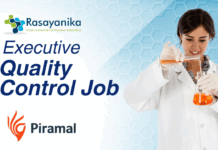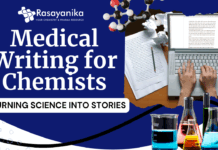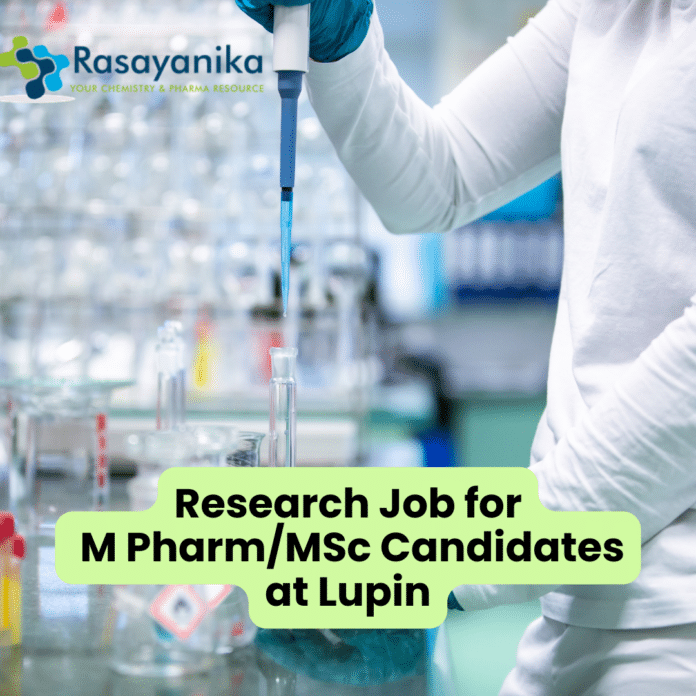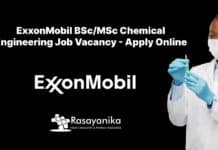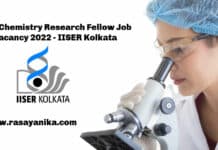Research Job for M Pharm/MSc Candidates at Lupin
Lupin Limited is an Indian multinational pharmaceutical company. Research Job for M Pharm/MSc Candidates at Lupin. Interested Candidates can check out the details below and Apply Online.
Job Post: Research Associate – Pharma Research, TVK (LRP)
Job Location: Pune, RD, MH, IN
Job Company: Lupin
Job Category: Pharma Research, TVK (LRP)
Job Type: Full Time
Job Description:
- Analysis of MDI / DPI/ Nasal products for routine and stability analysis.
- Handling of Pulmonary testing equipment’s like ACI, NGI, DUSA, Spray view, Spraytec, Automated actuation system Handling of HPLC and GC equipment to support routine, stability and development studies.
- API verification and Method validation of MDI/ DPI/ Nasal / Nebulizers.
- Qualification of instrument/ Equipment.
- Analytical method transfer to QC locations.
- Sound technical knowledge of analytical instrumentation, applications & techniques as described in job description.
- Must be aware of relevant guidelines and pharmacopoeia requirements of pulmonary testing.
- Should possess good analytical skills.
- Hands on experience on HPLC, GC, Malvern particle analyzer instruments, Spray view, Automated actuation systems.
- Prior experience of MDI/ DPI/ Nasal testing is preferred.
Education – M. Pharm/M.Sc.
Total Experience – 1 to 5 Years.
Research Job for M Pharm/MSc Candidates at Lupin. Here are five interview questions and suggested answers for the Research Associate at Lupin:
1. Question: Can you describe your experience with the analysis of MDI/DPI/Nasal products for routine and stability analysis? What techniques and instruments have you used for these analyses?
Answer: In my previous role, I was actively involved in the analysis of MDI (Metered Dose Inhalers), DPI (Dry Powder Inhalers), and Nasal products for routine and stability analysis. I utilized various analytical techniques, including High-Performance Liquid Chromatography (HPLC) and Gas Chromatography (GC), to assess the quality and stability of these products. These analyses helped ensure product efficacy and adherence to regulatory standards.
2. Question: Could you provide examples of your experience in handling pulmonary testing equipment such as ACI, NGI, DUSA, Spray view, and Spraytec? How did you ensure accurate and reliable results from these instruments?
Answer: I have hands-on experience with pulmonary testing equipment like ACI (Anderson Cascade Impactor), NGI (Next Generation Impactor), DUSA, Spray view, and Spraytec. To ensure accurate and reliable results, I followed rigorous calibration and maintenance procedures for these instruments. Regular instrument qualification and performance checks were conducted to verify accuracy. Additionally, I maintained a well-documented protocol for instrument handling and operation to minimize variability in test results.
3. Question: Can you describe your involvement in API verification and method validation for MDI/DPI/Nasal/Nebulizers? What steps did you follow to ensure the validity and accuracy of analytical methods?
Answer: I played a crucial role in API (Active Pharmaceutical Ingredient) verification and method validation for MDI, DPI, Nasal, and Nebulizers. To ensure method validity and accuracy, I followed established validation protocols, including specificity, accuracy, precision, linearity, and robustness studies. I also performed system suitability tests and verified the reliability of the methods. Documentation and adherence to regulatory guidelines were central to this process to guarantee the quality and integrity of the analytical methods.
4. Question: How have you managed the transfer of analytical methods to QC (Quality Control) locations in your previous role? What challenges did you encounter, and how did you overcome them?
Answer: Method transfer to QC locations is a critical aspect of ensuring consistent product quality. In my previous role, I initiated method transfer protocols that included clear documentation, step-by-step procedures, and hands-on training for QC personnel. Challenges sometimes included differences in equipment or environmental conditions between the research and QC laboratories. However, effective communication and collaboration with QC teams helped us address these challenges and ensure a seamless method transfer process.
5. Question: Could you share your experience with staying updated on relevant guidelines and pharmacopoeia requirements for pulmonary testing? How do you ensure compliance with these standards in your work?
Answer: Staying updated on guidelines and pharmacopoeia requirements is essential for maintaining compliance and quality in pharmaceutical research. I regularly monitored updates from regulatory bodies and pharmacopoeias relevant to pulmonary testing. Additionally, I participated in industry seminars, workshops, and training sessions to enhance my knowledge. This proactive approach allowed me to ensure that our laboratory practices and analytical methods consistently met the latest standards and requirements.
These interview questions and answers should help you prepare for an interview for the Research Associate – Pharma Research position at Lupin in Pune, Maharashtra, India.
Subscribe Rasayanika for more Chemistry and Pharma job updates.









